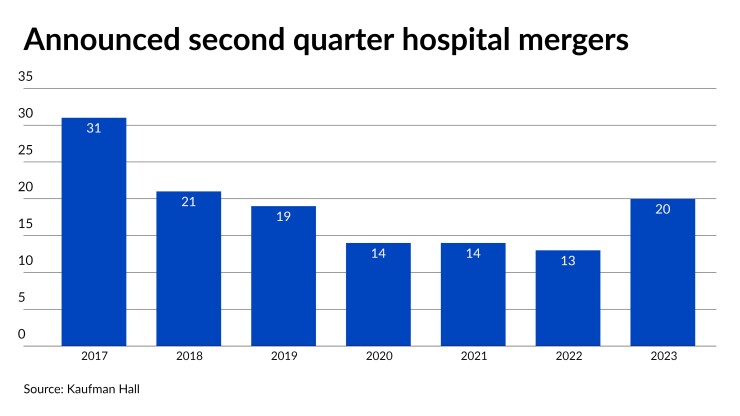Hospital and health system mergers picked up steam during the second quarter, providing signs of a strengthening COVID-19 pandemic recovery and the sector's heightened attention to the benefits of consolidation as it navigates the pressures bruising margins.
Transactions announced for the second quarter rose to 20 involving $13.3 billion of revenues from 15
The 20 announced transactions marks the highest quarterly number since the first quarter of 2020, when the pandemic began. In a year-over-year comparison before the pandemic, the sector saw 19 transactions in the second quarter of 2019 and 21 transactions for the second quarter of 2018.

"This was true not only with respect to the number of announced transactions, but also with respect to the total transacted revenue for the quarter," the financial advisory firm said in its report.
"The average size of the smaller party by annual revenue remained elevated, although the higher number of total transactions slightly diluted the impact of three 'mega mergers' announced in the quarter."
Kaufman Hall puts a "mega" label on transactions where either party has annual revenues of at least $1 billion.
Three transactions fit the bill for the quarter — Froedtert Health and ThedaCare which announced in April their signing of a letter of intent to merge; Kaiser Foundation Hospitals and Geisinger Health's April announcement launching Risant Health, a not-for-profit organization created by Kaiser Foundation Hospitals, with Geisinger as its first member; and
The advisory firm sees the ability to expand and optimize organization capabilities as a major driver in recent large system transactions, like the creation of Risant Health by Kaiser Hospital Foundation and the Froedtert Health and ThedaCare merger.
Froedtert and ThedaCare have already partnered in some areas to expand care and their combination isn't driven by fiscal concerns but by healthcare delivery goals. The long-term goal of Risant is expansion of value-based care by "acquiring and connecting a portfolio of like-minded, nonprofit, value-oriented community-based health systems anchored in their respective communities."
The average size of the seller or smaller party, as measured by annual revenues, remained high at $664 million although that was down from $852 million in 2022. when the number of transactions was still lagging but the size by revenues was a notable standout.
While the number of transactions rose for the second quarter, revenues involved dropped from $19.2 billion compared to the second quarter last year while coming in higher than comparable quarters between 2017 and 2020.
The 20 deals involved eight not-for-profit systems, four investor-owned health system, two religiously affiliated systems, four academic/university-affiliated organizations, one governmental organization, and one academic organization partnering with multiple not-for-profit organizations.
The quarterly report is the first since Kaufman Hall closed on its acquisition of Ponder & Co. in May. Ponder also published quarterly M&A activity levels. "We look forward to adding their expertise and insights to our quarterly and year-end reports," Kaufman Hall said.
In one of the latest announcements that will show up in third quarter numbers, Duluth-based St. Luke's and Wausau, Wisconsin-based Aspirus Health Wednesday signed a letter of intent announcing plans for St. Luke's to affiliate with Aspirus to "create a comprehensive health care system serving residents of northeastern Minnesota, northern and central Wisconsin and the Upper Peninsula of Michigan."
The partnership would extend Aspirus' reach into Minnesota while providing St. Luke's a broader network of services and capital resources. Aspirus had $1.9 billion of operating revenue last year. St. Luke's had $547 million of revenue in 2021.
"Evolving community needs require us to find new and innovative approaches to delivering care. The strength of Aspirus Health will enable St. Luke's to accelerate investment in our communities and expand our impact faster than we can on our own," said Eric Lohn, St. Luke's co-president/CEO and chief financial officer.
The combined organization will operate 19 hospitals — 17 of which Aspirus brings to the table. The system will operate headquarters in Wausau and maintain a corporate office in Duluth.
Moody's Investors Service in April affirmed Aspirus' A1 rating and stable outlook saying it expects the system to "maintain its favorable market position as an integrated delivery system with a broad footprint in northern and central Wisconsin and the Upper Peninsula of Michigan."
The system has been in growth mode, acquiring seven hospitals, 21 physician clinics, and air and ground medical transport services located in north and central Wisconsin Ascension Health in 2021.
S&P Global Ratings affirmed Aspirus' AA-minus rating and negative outlook last November.
S&P affirmed St. Luke's BBB-minus rating and stable outlook when the system borrowed in the spring of 2022 to fund phase two of its campus redevelopment plan and a surgical expansion project and other projects at its facilities. "The BBB-minus rating on St. Luke's reflects a light balance sheet profile, including higher pro forma debt levels and improving, but still light unrestricted reserve levels," S&P said.





